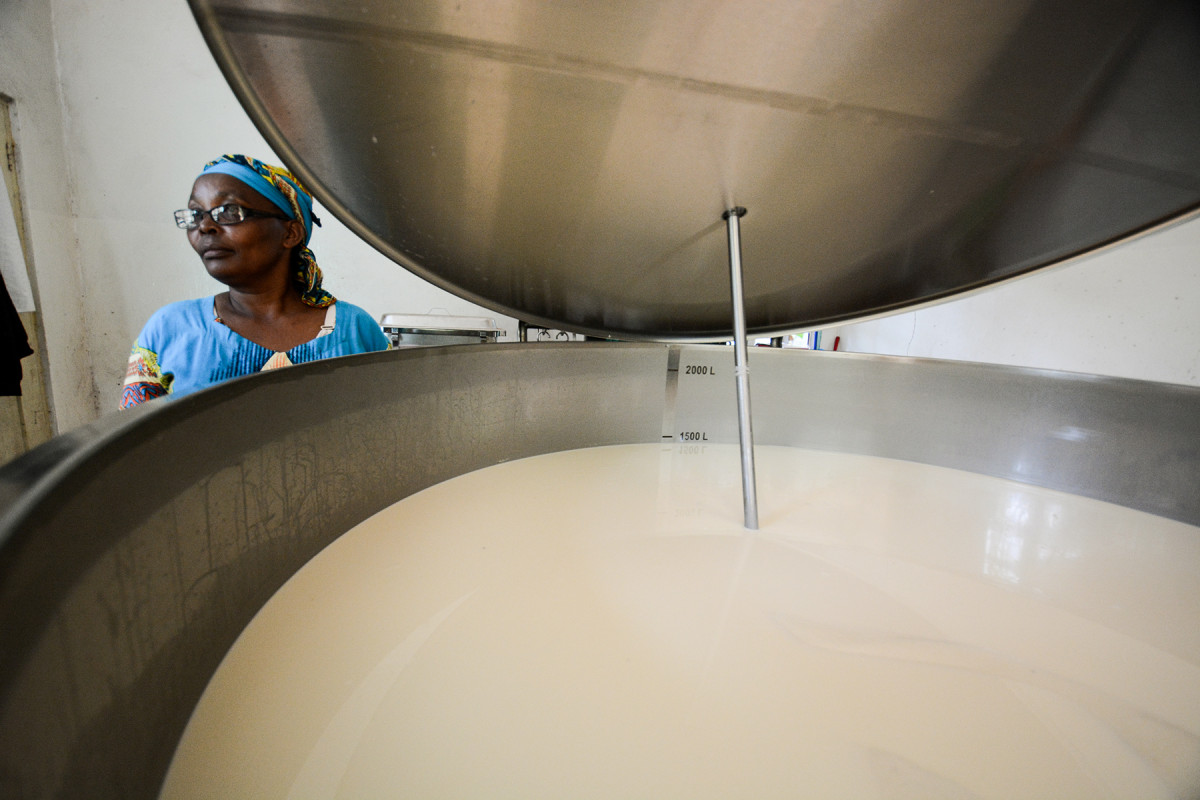
Upgrading Tanzania’s dairy value chain to unlock its productivity potential
While one out of every 10 cows in Africa is located in Tanzania, the performance of the country’s dairy sector is far below its potential. Tanzania’s dairy contributes a mere 1.5% to the country’s GDP, while in neighboring Rwanda and Kenya, the sector contributes about 6% to each country’s GDP.
This low performance is attributed to various reasons, but low investments in the sector is a primary one. Lack of productivity in the sector means that the consumption of milk—an important source of protein and essential micronutrients, particularly for children and pregnant and nursing mothers—is low.
The identification of the most appropriate technology packages to address major challenges facing the dairy value chain and scaling pathways, therefore, has been a priority for the CGIAR Research Program on Livestock (Livestock CRP), comprising a partnership between the International Livestock Research institute (ILRI), Alliance Bioversity-CIAT (ABC) and local public and private actors.
According to Amos Omore, who leads the Livestock CRP in Tanzania—where it is locally referred to as Maziwa Zaidi (More Milk), the project is focused on delivering a basket of demand-driven integrated technologies, as opposed to the traditional approach of pushing single technologies.
'The ingredients for integration include proven technologies such as Brachiaria grass for feed; East Coast fever (ECF) vaccine for health; proper management of manure management to reduce greenhouse gas emissions; and, artificial insemination (AI) using semen from proven sires under another project, Africa Dairy Genetics Gains (ADGG),’ he said.
The Maziwa Zaidi project is leveraging results from ADGG’s digital platform, which records the performance of cattle herds in Tanzania. ADGG is testing the use of on-farm records for genetic & genomic evaluation to identify superior cross-bred bulls across the country. Selected bulls are used for AI delivery and planned natural mating, to make more productive cattle widely available to farmers.
Building on its previous phase, Maziwa Zaidi has engaged key stakeholders to define pathways for scaling the use of the integrated technologies, which include scaling ambitions, pathways, critical factors, challenges and potential solutions to scaling.
The delivery mechanisms tested include building the capacity of youth agripreneurs and agribusinesses to access markets, ensuring safer products, encouraging effective collective action and developing business and soft skills to run profitable businesses. The project has also ensured that gender constraints are taken into consideration, so that both men and women can benefit from the interventions.
 Smallholder farmers sell their milk to dairy cooperatives such as this one in Tanga, Tanzania. Photo G. Smith/Alliance Bioversity International and CIAT
Smallholder farmers sell their milk to dairy cooperatives such as this one in Tanga, Tanzania. Photo G. Smith/Alliance Bioversity International and CIAT
‘We are supporting agripreneurs to establish successful and profitable enterprises along the milk value chain. We are running incubation and/or mentorship programs for them to build their skills to contribute to improved business performance,’ Amos explained.
The project is also working with policy and institutional enablers to create conducive environments that support the uptake of the technologies and innovations. These include engagements in support of the Tanzania Livestock Master Plan (TLMP) that was launched in 2019 as part of Tanzania’s current blueprint for the agricultural sector, Agriculture Sector Development Programme Phase II (ASDP II).
‘Our aim is to see country ownership of the breeding program; continue promoting use of top ranked bulls to improve farmers’ livestock stock and continue building and refining the ICT platform including integration with other data platforms. We also see this work expanding to other countries,’ Amos concluded.
--
Amos Omore delivered these messages at a webinar (watch from 4.06 to 26.15) on World Milk Day, 1 June 2021, aimed at highlighting opportunities and initiatives for the development of sustainable dairy farm systems in East Africa. The webinar was organized by Sustainable Food Systems Ireland / Irish Forum for International Agricultural Development (IFIAD).
See Amos Omore’s presentation: Better lives through livestock: ILRI in East Africa - Focus on dairy [June 2021]





